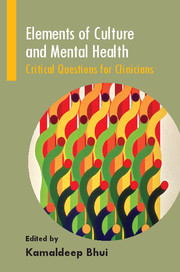Book contents
- Frontmatter
- Contents
- List of contributors
- Foreword: Desire and commitment: essential ingredients in learning about culture and mental illness
- 1 Is trauma-focused therapy helpful for survivors of war and conflict?
- 2 Will ethnopsychopharmacology lead to changes in clinical practice?
- 3 Does cognitive–behavioural therapy work for people with very different cultural orientations and backgrounds?
- 4 Can you do meaningful cognitive–behavioural therapy through an interpreter?
- 5 Are particular psychotherapeutic orientations indicated with specific ethnic minority groups?
- 6 Can psychotherapeutic interventions overcome epistemic difference?
- 7 On the role of culture and difference in evaluation, assessment and diagnosis
- 8 Necessary and sufficient competencies for intercultural work
- 9 On the validity and usefulness of existing Eurocentric diagnostic categories
- 10 Benefits and limitations of the cultural formulation in intercultural work
- 11 Barriers to the intercultural therapeutic relationship and how to overcome them
- 12 How does intercultural interpretation work in the mental health setting?
- 13 Do the power relations inherent in medical systems help or hinder in cross-cultural psychiatry?
- 14 Recovery and well-being: a paradigm for care
- 15 Social perspectives on diagnosis
- 16 Public mental health and inequalities
- 17 Can you do psychotherapy through an interpreter?
- 18 Can race and racism be acknowledged in the transference without it becoming a source of therapeutic impasse?
- 19 Cultural competence: models, measures and movements
- 20 Religion, spirituality and mental health
- Index
8 - Necessary and sufficient competencies for intercultural work
Published online by Cambridge University Press: 01 January 2018
- Frontmatter
- Contents
- List of contributors
- Foreword: Desire and commitment: essential ingredients in learning about culture and mental illness
- 1 Is trauma-focused therapy helpful for survivors of war and conflict?
- 2 Will ethnopsychopharmacology lead to changes in clinical practice?
- 3 Does cognitive–behavioural therapy work for people with very different cultural orientations and backgrounds?
- 4 Can you do meaningful cognitive–behavioural therapy through an interpreter?
- 5 Are particular psychotherapeutic orientations indicated with specific ethnic minority groups?
- 6 Can psychotherapeutic interventions overcome epistemic difference?
- 7 On the role of culture and difference in evaluation, assessment and diagnosis
- 8 Necessary and sufficient competencies for intercultural work
- 9 On the validity and usefulness of existing Eurocentric diagnostic categories
- 10 Benefits and limitations of the cultural formulation in intercultural work
- 11 Barriers to the intercultural therapeutic relationship and how to overcome them
- 12 How does intercultural interpretation work in the mental health setting?
- 13 Do the power relations inherent in medical systems help or hinder in cross-cultural psychiatry?
- 14 Recovery and well-being: a paradigm for care
- 15 Social perspectives on diagnosis
- 16 Public mental health and inequalities
- 17 Can you do psychotherapy through an interpreter?
- 18 Can race and racism be acknowledged in the transference without it becoming a source of therapeutic impasse?
- 19 Cultural competence: models, measures and movements
- 20 Religion, spirituality and mental health
- Index
Summary
‘Over and over again it has been necessary to learn the lesson that the observer influences the observed. In the field of mental health, we have not only to reckon with the natural effect of the observers’ own bias but we also have to deal with a second variable: the effect of this bias on the patient.’
(Jackson, 1960: pp. 5–6)Intercultural work has converted into a daily reality the challenges of demographic change taking place all over the world (International Organization for Migration, 2012). Professionals who work in intercultural contexts are inevitably affected by the experiences and perceptions of patients from different cultures, and this can place a strain on their professional role (Smedley et al, 2002; Qureshi & Collazos, 2005; de Leon Siantz, 2008; Engebretson et al, 2008; Clark, 2009; Blume & Lovato, 2010). Mental healthcare professionals continue to raise questions about the sort of knowledge and skills base that contribute most to effective and sensitive intercultural work (Cunningham et al, 2002; Kumagai & Lypson, 2009; Ben-Ari & Strier, 2010; Mian et al, 2010):
• What sorts of adjustments should one make to meet the needs of a patient from a different culture?
• Beyond linguistic difficulties, manageable with the participation of a medical interpreter or intercultural mediator (see Chapter 11, this volume), what should the clinician keep in mind in order to adequately attend to the patient?
• How can cultural knowledge be applied effectively rather than get in the way?
• What abilities is it most useful to develop?
• Can they be applied to all patients from the same ethnic group?
• Which attitudes facilitate the creation of a therapeutic space and effectiveness in intercultural work? Should the clinician directly raise the matter of clinician–patient differences (race, ethnicity, etc.), or is it better to wait for the patient to take the initiative?
• How can clinicians develop their cultural competence without losing their personal professional style, which is founded on their own professional and cultural background?
Many institutions have published position statements, teaching materials and literature promoting cultural competence.
- Type
- Chapter
- Information
- Elements of Culture and Mental HealthCritical Questions for Clinicians, pp. 36 - 41Publisher: Royal College of PsychiatristsPrint publication year: 2013

